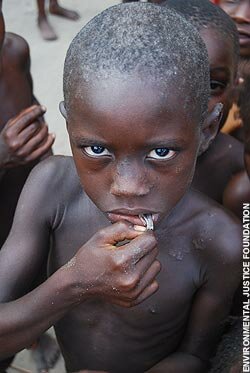As we celebrate the first ever World Oceans Day, I find myself doing so with mixed emotions. Without a doubt it is time the oceans got the recognition they deserve - they are stunning, full of incredible diversity and immeasurable beauty.
- We need your help to protect Sierra Leone from illegal pirate fishing - Environmental Justice Foundation

In Sierra Leone 80 per cent of animal protein in the average diet comes from the ocean
As a child I grew up by the ocean, on the oceans, and whenever possible in the oceans, and they are a fundamental part of my life. I feel blessed that I get go to work every day and work to save the oceans.
There is no doubt that they need saving. It’s become very clear that the oceans, that for so long seemed so vast, are far from infinite.
We are putting them under incredible pressures, and the impacts of pollution, acidification and climate change are adding up fast.
It is now very clear that we are completely over-fishing our oceans, starkly demonstrated by The End of the Line.
That 80 per cent of global fish stocks are fully exploited or depleted, and the prediction that we’ll run out of fish by 2048, is pretty scary.
I realise that for many these figures seem far from home. Not for me. My job as an oceans campaigner has taken me all over the world to investigate illegal fishing, which is both a cause and effect of over-fishing.
I’ve seen the jagged holes left in coral reefs after they’ve been dynamited, and been appalled as a live shark had its fins cut off for the soup trade, and was then dumped over the side still desperately trying to swim.
I’ve photographed illegal trawlers hauling in nets of thousands of organisms scraped off the seabed. And I’ve documented the fishermen sorting through the catch for the species the developed world wants to eat, and then dumping everything else, sometimes three quarters of the total, over the side, dead.
I’ve experienced first-hand how we are destroying the marine environment, and the species that live in it.
Incredibly, this is not what sticks most in my mind. For every illegal industrial fishing vessel in regions like West Africa, there are hundreds of local communities on shore that depend on fish for their survival.
The pirate trawlers are stealing from some of the poorest people in the world, and I’ve heard their stories.
How fishers have lost their nets to trawlers that have deliberately run through them, and been attacked with boiling water.
I’ve listened as mothers explain how their children cannot go to school because without fish there is no income, and spoken to family members who have lost loved ones to easily healed injuries and diseases because they cannot afford medicines.
Most seriously though, are the people I’ve met who are desperately hungry. The food security issues associated with overfishing are not publicised enough, but the stark truth is that millions of people are facing starvation.
In the UK we eat about one and a half portions of fish a week. If we run out of fish we would miss it, but we could adapt.
Compare this with Sierra Leone, where 80 per cent of animal protein comes from the ocean. Fish is the basis of a diet where there are essentially no other options. Coastal communities have a few fruit trees, and fish.
They sell extra fish in order to buy other staples, like rice. No fish, no food. I’ve met kids who have eaten only mangoes for a week, and fishermen who say the only way they can feed their families is by following the trawlers and picking up the fish that are dumped.
Every day that I am in West Africa I am approached by individuals asking me if there is anything I can do to help their families, often in a painstakingly written letter. It’s heartbreaking.
And it’s not just Sierra Leone. Around the world one third of the world’s six billion people rely on fish and other aquatic products for some of their annual protein intake, and developing states in particular are facing plunging fish stocks, poverty and a looming food security crisis.
The challenges to overcome this situation are going to become greater as the world population grows, and as more evidence emerges that climate change is going to have a negative impact on fisheries.
These are massive challenges, but there are solutions. So let’s celebrate World Oceans Day, the oceans deserve it.
Then, as a global community, I’d ask that we work together to make the changes that are needed to ensure that all the world, especially those in the developing world who depend most on the oceans, are always going to be able to celebrate.
Duncan Copeland is a Campaigner for the Environmental Justice Foundation
![]()



I know that ideally, to make the problem better, the amount of out-of-bounds ocean should be greatly extended, then fishermen should be given some sort of allowance each… but realistically …is that likely to happen? Is the answer to invest in a mass breeding (in captivity) of remaining stocks, so as to provide a more sustainable food resource?
I haven’t yet seen the film- I have a feeling if I do, I will just be even more depressed about the state of the world. First the Age of Stupid and now this!? I’m sure it is a very well researched book, but isn’t the film just more doom and gloom on a subject we, the public, can do very little about?